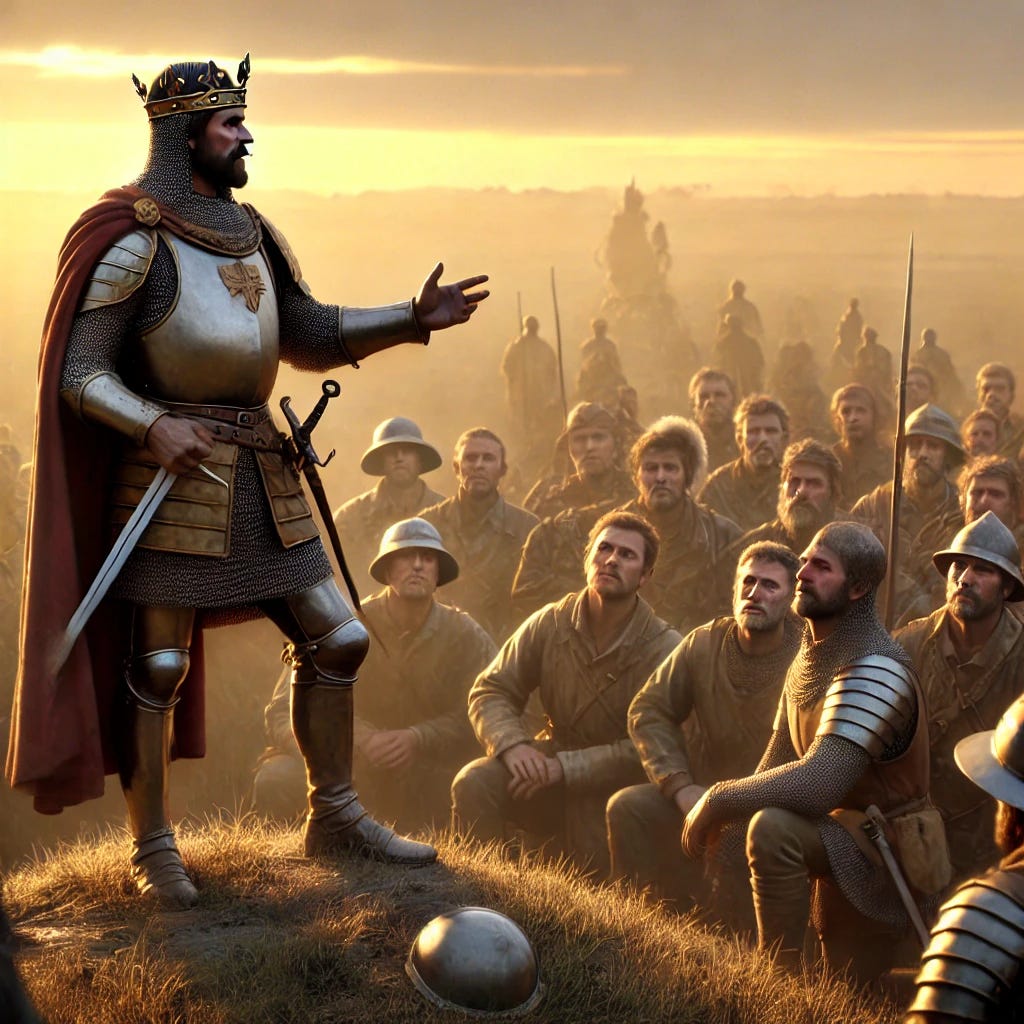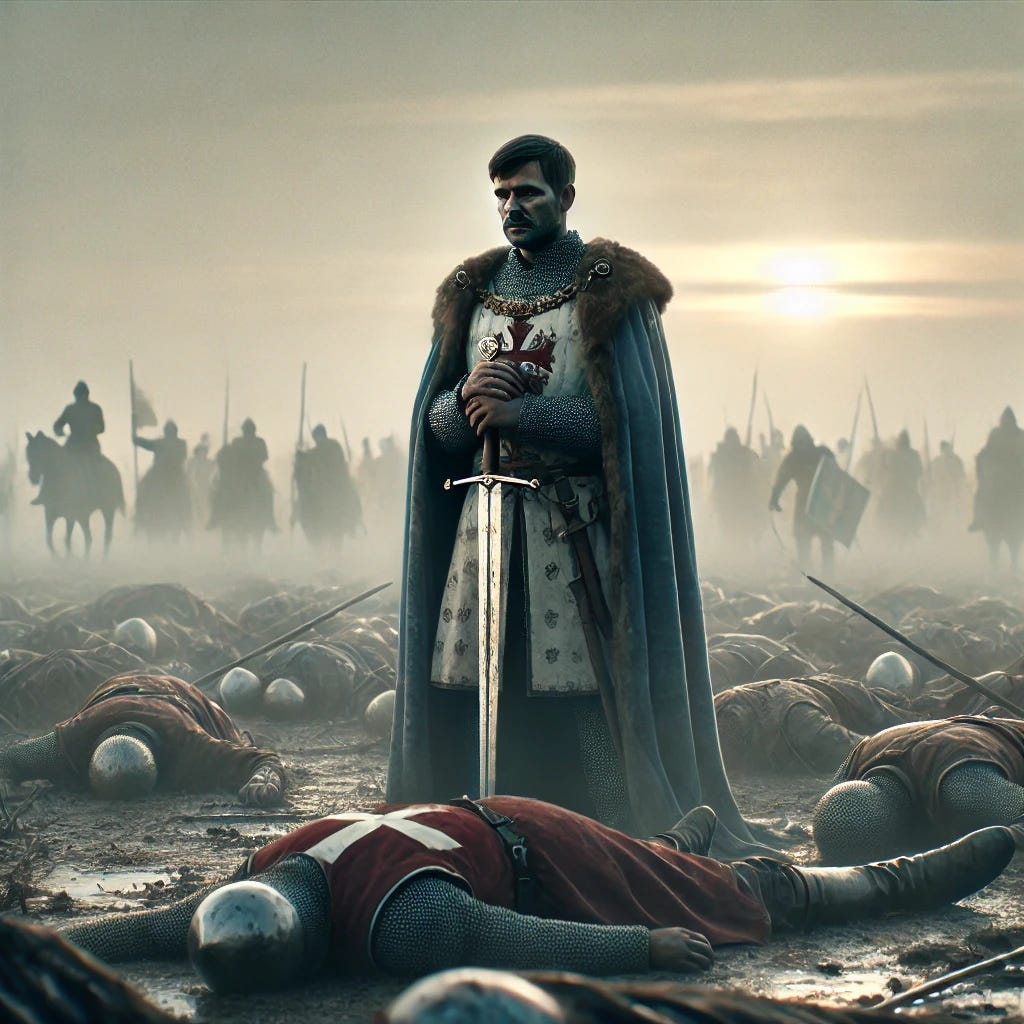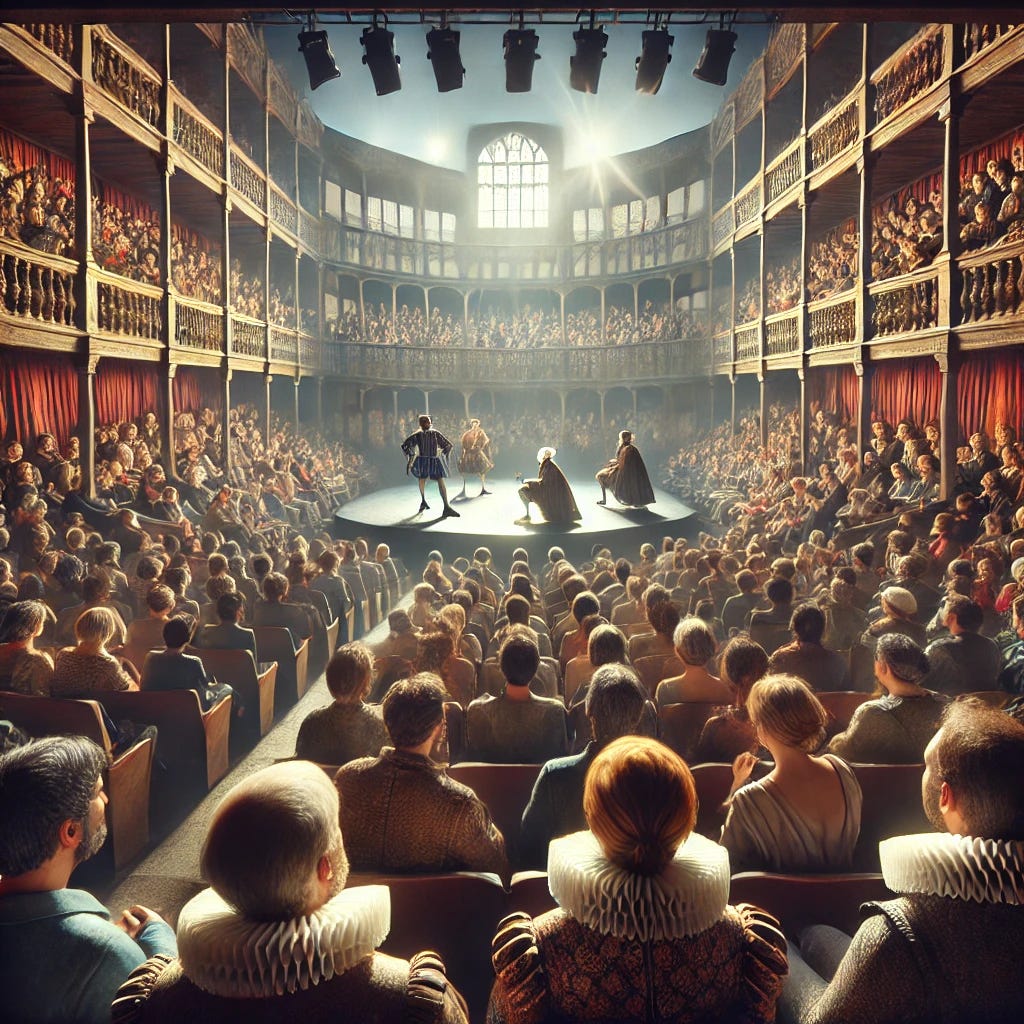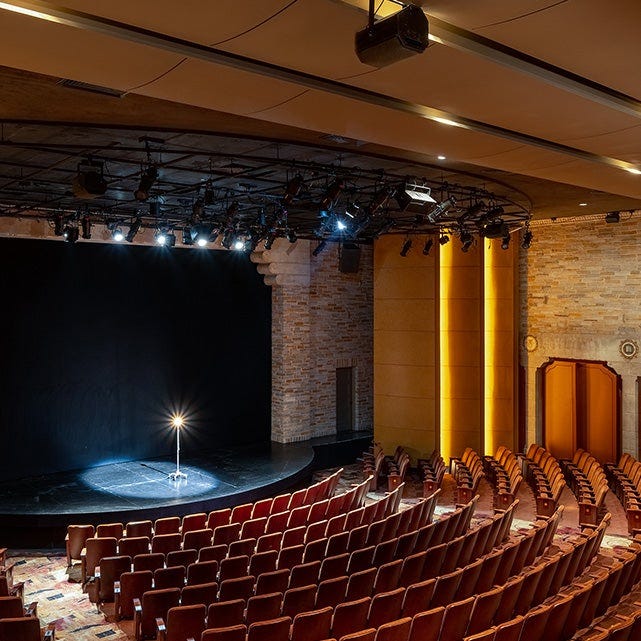Playing the King
My Journey as Henry V and Saccio’s Critique of the Warrior King
Back in the late 90s, when I was a graduate student at UCLA, I was cast as Henry V in a production of Shakespeare’s iconic history play. It was, to say the least, an unexpected choice. As a man of Armenian-Iranian heritage with an anti-theist background, and someone deeply immersed in Gnosticism, Hermeticism, and the occult, embodying the quintessential Christian king presented a fascinating challenge. Here was a character who wielded the sword of divine right, a man driven by his unwavering faith in the righteousness of his cause—a perspective I found both alien and intriguing. The experience of stepping into Henry’s mindset, reconciling his fervent Christianity with my own philosophical pursuits, was transformative.
Now, recently, you may recall, I posted about Peter Saccio’s Shakespeare’s English Kings: History, Chronicle, and Drama and how it influenced me in my undergrad work. It was now in my graduate studies that I picked up the text once again for some insight into the character and play. Saccio’s critique of Henry V illuminated not just the character I portrayed, but the broader interplay between history, myth, and Shakespeare’s dramatic craft. In his analysis, Saccio reveals Henry as a figure of both awe and ambivalence—Shakespeare’s “ideal Christian king” but also a cunning propagandist, whose faith and ambition raise probing questions about power, morality, and leadership.
The "Ideal Christian King"
Saccio delves deeply into the historical and theatrical portrayal of Henry V, situating him as the epitome of the Christian warrior-king. Shakespeare’s Henry, particularly in Henry V, is a man of action and conviction, who sees himself as an instrument of divine will. His stirring speeches—most famously the St. Crispin’s Day oration—rally his men with the assurance that God is on their side, casting their fight against the French as both a political and spiritual mission.
For me, as someone skeptical of religious orthodoxy, it was both fascinating and disconcerting to channel this level of faith. Henry’s belief in his divine mandate is not just a personal conviction but a powerful rhetorical tool that binds his followers to his cause. Saccio’s critique, however, draws attention to the tension between Henry’s outward piety and his political pragmatism. Is Henry’s faith genuine, or is it a convenient justification for conquest and violence? This ambiguity made the role all the more compelling to explore.
The Politician and the Propagandist
Saccio argues that Henry V is as much a politician as he is a king. His ability to manipulate language and perception is central to his success, both on and off the battlefield. In the play, Henry’s calculated threats to the citizens of Harfleur and his measured response to the traitorous Scroop showcase a man who understands the power of fear and spectacle. Even his famous speeches, while stirring, can be seen as tools of manipulation, designed to inspire loyalty and courage in the face of overwhelming odds.
For me, this aspect of Henry resonated with my interest in Gnosticism and Hermeticism, particularly the idea of hidden truths and the manipulation of perception. Henry’s outward persona as the noble Christian king conceals the shrewd strategist who understands that victory depends as much on morale and image as it does on strength of arms. This duality—between the spiritual and the pragmatic—aligned with the archetypal conflicts I often explored in my studies of esoteric traditions.
Saccio’s Critique: A Flawed Hero
While Shakespeare celebrates Henry’s leadership and heroism, Saccio does not shy away from examining the darker implications of his reign. The conquest of France, portrayed in the play as a divinely sanctioned triumph, was in reality a brutal campaign that left devastation in its wake. Saccio highlights how Shakespeare omits or glosses over the human cost of Henry’s ambition, focusing instead on the glory of his victories.
This critique struck a chord with me as I reflected on my own portrayal of Henry. It was easy to be swept up in the romance of the character—his eloquence, his charisma, his sense of destiny. But Saccio’s analysis reminded me to look beneath the surface, to consider the lives lost and the moral compromises made in the name of divine right. It challenged me to grapple with the question of whether Henry’s greatness as a leader excuses his flaws as a man.
Faith and Leadership
One of the most intriguing aspects of playing Henry was reconciling his devout Christianity with my own anti-theist perspective. Saccio emphasizes the centrality of faith to Henry’s character, not just as a personal belief but as a cornerstone of his legitimacy as king. His reliance on prayer and his invocation of God’s will are key to his identity, both as a man and a ruler.
For me, this was the hardest aspect of the role to embody. My studies of Gnosticism and Hermeticism had led me to view faith as a complex, often ambiguous force—one that could enlighten or obscure, liberate or oppress. Henry’s faith, by contrast, is portrayed as pure and unshakable, a source of strength rather than doubt. Yet Saccio’s critique opened the door for me to see the cracks in this façade, to explore the possibility that Henry’s faith, like his rhetoric, is as much a performance as a conviction.
Playing Henry V at UCLA was one of the most challenging and rewarding experiences of my life. It forced me to confront questions of faith, power, and morality in ways I had never anticipated. Saccio’s critique of the character deepened my understanding of Henry, revealing him not just as a hero or a villain, but as a profoundly human figure—flawed, complex, and endlessly fascinating.
Through Henry V, Shakespeare created a king who embodies the best and worst of leadership: the ability to inspire and unite, but also the capacity to deceive and destroy. Saccio’s analysis reminds us that greatness is never without cost, and that even the most celebrated figures in history are shaped as much by their contradictions as by their triumphs. For me, Henry V will always be a reminder of the power of storytelling to reveal, challenge, and transform—not just the characters on stage, but the actors who bring them to life.





